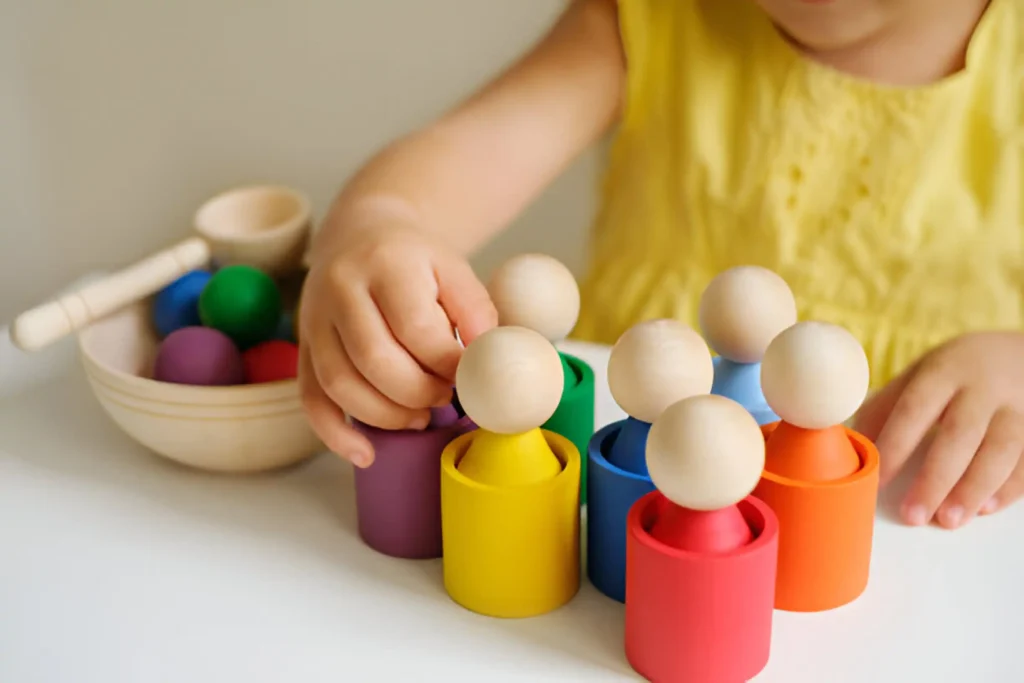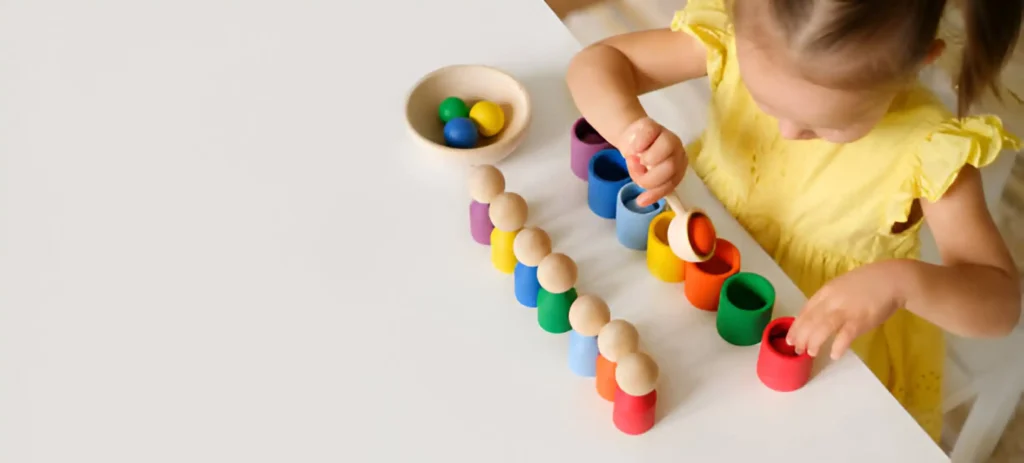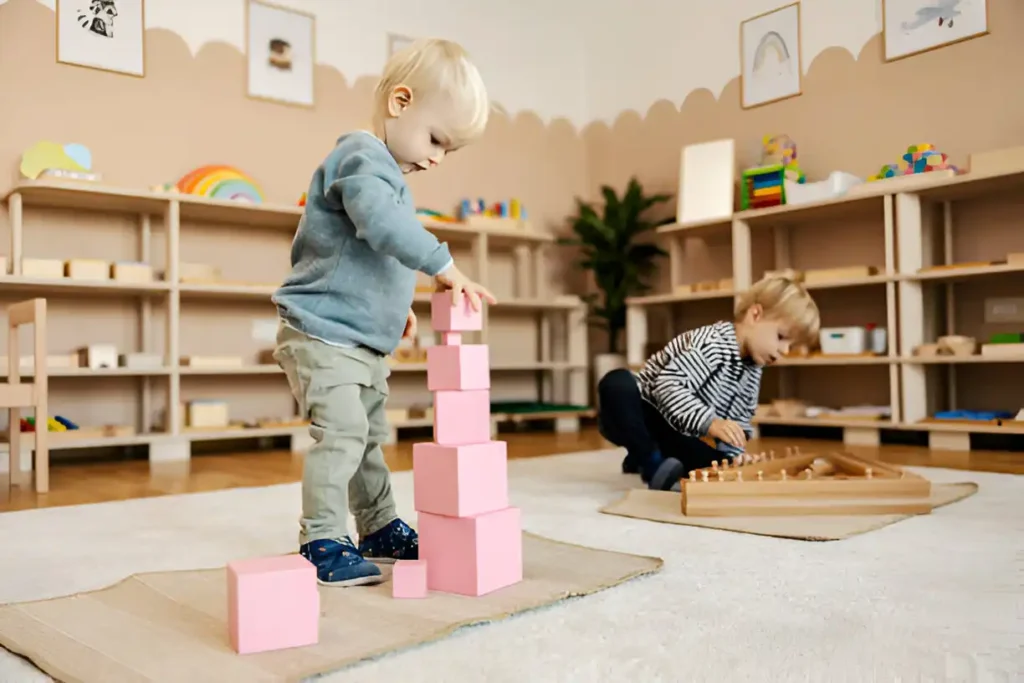Introduction
Parenting is a continuous journey, one that evolves as both parents and children grow. Each stage of your child’s development brings new challenges and opportunities for learning. Amidst the many parenting philosophies, Montessori parenting has gained immense popularity for its balanced, respectful, and child-centered approach.
This revolutionary method emphasizes the nurturing of independence, confidence, and creativity in children, giving them the tools they need to thrive in the world. For many parents, the Montessori approach has proven to be an effective way to manage the complexities of child-rearing while fostering a deep sense of autonomy and responsibility in their children. If you’re seeking practical ways to integrate Montessori principles into your daily routine, these 10 genius Montessori parenting hacks are just what you need.
The Montessori Parenting Revolution
Montessori parenting represents a significant shift from the traditional methods that many parents may be familiar with. Rooted in the educational philosophy developed by Dr. Maria Montessori, this approach prioritizes the natural development of a child’s physical, emotional, and intellectual capacities. Montessori parenting is not merely about setting rules or imposing structure; instead, it is about creating an environment that encourages curiosity, self-motivation, and a love for learning.
The revolution here lies in the shift from parent-directed learning to child-led discovery, where parents act as guides rather than enforcers. This fosters a deeper, more meaningful connection between parent and child, as well as an environment where the child feels empowered to explore and grow.
Why You Need These 10 Genius Hacks in Your Parenting Toolbox
Parenting can often feel overwhelming, especially with the multitude of tasks that come with raising children. Montessori parenting offers an antidote to this chaos by providing simple, effective hacks that make everyday life smoother for both parents and children. These hacks help create an environment where your child can develop essential life skills while allowing you to reduce the strain of constant supervision and intervention. Incorporating these Montessori techniques into your parenting toolbox will not only streamline your routines but also foster a sense of responsibility and independence in your child. By empowering your child to take charge of their own growth and learning, you can focus on nurturing their natural abilities rather than micromanaging their every move.

Understanding the Montessori Approach
At the core of Montessori parenting is a profound respect for the child as an individual with their own needs, interests, and pace of development. It’s important to first understand these foundational principles before diving into the hacks that can make this approach work for you.
The Key Principles of Montessori Parenting
Montessori parenting is grounded in several key principles: respect for the child, hands-on learning, and fostering independence. Respecting the child means treating them as capable individuals who can make decisions, explore their environment, and learn from their experiences. Hands-on learning emphasizes the importance of tactile experiences—children learn best when they can manipulate objects and engage their senses. Independence, perhaps the most defining feature of Montessori, involves creating an environment where children can take the lead in their activities, making choices and solving problems on their own.
How Montessori Differs from Traditional Parenting Styles
Unlike traditional parenting styles, which often focus on direct instruction and control, Montessori allows children to take ownership of their learning. In traditional settings, adults typically dictate what the child should do, when, and how. Montessori flips this on its head, encouraging the child to explore based on their natural curiosities. The adult’s role is to guide and facilitate, not to dictate or control. This method fosters creativity, critical thinking, and independence, traits that are less emphasized in more traditional models of parenting.
Why Montessori Fosters Independence and Confidence
Children who are given the freedom to make decisions and learn through their own experiences naturally develop a stronger sense of independence and self-confidence. Montessori parenting provides children with opportunities to face challenges, solve problems, and achieve success on their own. This builds resilience and teaches them that they are capable individuals. Over time, these experiences help children develop a robust sense of self-worth and confidence that carries them through life.
Setting Up a Montessori-Friendly Home
The environment plays a crucial role in Montessori parenting. A well-organized, accessible home can encourage your child to engage in activities independently and confidently.
Creating a Child-Centered Environment
A Montessori-friendly home places the child at the center of its design. This means that spaces are tailored to the child’s height, strength, and abilities, making it easier for them to access tools, toys, and materials without adult assistance. Low shelves, child-sized furniture, and simple, well-organized spaces help the child feel empowered to make choices and explore freely. By making their environment more accessible, you encourage your child to take initiative in daily activities, whether it’s selecting a toy, choosing a book, or getting dressed.
How to Design Spaces That Promote Independence
Designing Montessori spaces is about functionality and accessibility. Ensure that everything your child needs is within their reach. For example, in a Montessori kitchen setup, keep child-safe utensils, plates, and cups on low shelves so your child can access them without help. In their bedroom, create a low-hanging closet where they can pick out their own clothes. By arranging the environment to suit their needs, you foster an atmosphere of independence and self-reliance.
The Role of Natural Materials in Montessori Spaces
Natural materials are a key component of Montessori design. Instead of plastic toys and synthetic materials, Montessori spaces often incorporate items made of wood, cotton, wool, and other natural elements. These materials provide rich sensory experiences, helping children connect with the physical world in a meaningful way. Wooden blocks, for example, offer a more tactile and grounding experience than their plastic counterparts, helping children develop fine motor skills while also nurturing a deeper appreciation for the natural environment.
Hack: Simplify with Toy Rotation
One of the simplest and most effective Montessori hacks is toy rotation. This practice keeps your child engaged without overwhelming them with too many options.
Why Less is More: The Power of Toy Rotation
Children can become overstimulated when surrounded by too many toys, leading to shorter attention spans and less meaningful play. By rotating toys, you limit the number of available items, allowing your child to focus on and fully engage with each toy. This leads to deeper, more creative play, as children have the space to explore each item without distraction.
Step-by-Step Guide to Setting Up a Toy Rotation System
To set up a toy rotation system, begin by dividing your child’s toys into several groups. Place only one group of toys in the play area at a time, storing the others out of sight. Every few weeks, swap out the toys with a new group. This refreshes the play environment and keeps your child excited about their options without overwhelming them with too many choices.
Hack: Encourage Practical Life Skills Early

In Montessori, practical life skills are a cornerstone of development. These tasks teach children self-sufficiency and responsibility from a young age.
The Importance of Everyday Tasks in Montessori
Practical life activities, such as pouring water, cleaning up spills, or tying shoes, are valuable learning opportunities in Montessori. These tasks help children develop fine motor skills, coordination, and concentration. More importantly, they teach children that they are capable of contributing to their environment and caring for themselves.
Easy Practical Life Activities to Boost Your Child’s Independence
Start with simple tasks that your child can easily manage. For toddlers, this could be something as basic as wiping a table or putting away their shoes. As they grow older, you can introduce more complex activities like folding laundry, setting the table, or even helping to prepare meals. Provide child-sized tools to make these tasks easier and more enjoyable for them.
Hack: Focus on Open-Ended Play
Open-ended play is a key element in Montessori learning, as it promotes creativity and problem-solving.
How Open-Ended Toys Enhance Creativity and Problem-Solving
Unlike toys that have a fixed purpose (like electronic gadgets), open-ended toys encourage children to use their imagination. Blocks, dolls, and art supplies allow for endless possibilities, enabling children to create, experiment, and learn through play. These toys help develop problem-solving skills, as there is no single right way to use them.
Choosing the Best Montessori-Inspired Toys for Your Child
When selecting toys, opt for items that can be used in multiple ways. Wooden blocks, play silks, and natural objects like stones or shells are great examples. These toys invite children to think creatively and engage in imaginative play, which is critical for cognitive development.
Hack: Establish a Consistent Routine
Children thrive on routine, and Montessori parenting emphasizes the importance of creating a predictable daily schedule.
Creating Predictable Daily Schedules for Children
A consistent routine provides structure, helping children understand the flow of the day. This predictability reduces anxiety and gives children a sense of control over their environment. From morning routines to bedtime rituals, establishing consistency helps children feel secure and confident in navigating their daily activities.
How Routine Builds Security and Confidence
Knowing what to expect gives children a sense of stability. When they can anticipate what comes next—whether it’s meal time, play time, or nap time—they’re better equipped to handle transitions and challenges. Over time, this predictability fosters self-assurance and emotional resilience.
Hack: Use Positive Discipline Techniques
Montessori’s approach to discipline is rooted in respect and empathy, focusing on teaching rather than punishing.
Moving Away from Punishment: Montessori Discipline Basics
In Montessori, discipline is about guiding children toward making better choices, rather than imposing harsh consequences for mistakes. Montessori discipline uses natural consequences to teach children the impact of their actions. For instance, if a child spills water, they are encouraged to clean it up themselves, learning both responsibility and cause and effect.
How to Set Boundaries with Empathy and Respect
Boundaries are necessary, but they should be set with kindness and understanding. When setting limits, explain to your child why certain behaviors are unacceptable and offer alternative choices. This helps children understand the reasoning behind the rules, fostering cooperation rather than resistance.
Hack: Promote Self-Directed Learning

Self-directed learning is a cornerstone of Montessori education, encouraging children to follow their interests and explore at their own pace.
Why Self-Direction is the Key to Lifelong Learning
By giving children the freedom to choose their activities, you foster a sense of ownership over their learning. This autonomy helps children become more engaged and motivated, cultivating a love of learning that lasts a lifetime. They learn not because they are told to, but because they are genuinely interested in the world around them.
Setting Up Learning Stations for Exploration and Discovery
Create dedicated learning areas within your home, such as a reading nook, an art station, or a nature corner. These stations provide opportunities for independent exploration, allowing children to dive deeper into their interests and passions without adult interference.
Hack: Involve Your Child in Household Chores
Including your child in household chores is a great way to teach responsibility and practical life skills.
The Benefits of Involving Children in Daily Chores
Involving children in household chores not only teaches valuable life skills but also fosters a sense of contribution and belonging. Tasks like folding laundry, washing dishes, or sweeping the floor allow children to take pride in their work and understand that they play an important role in the family dynamic.
Age-Appropriate Chores that Foster Responsibility
For toddlers, simple chores like picking up toys or wiping down surfaces are great starting points. As children grow older, they can take on more complex tasks such as sorting laundry, preparing simple snacks, or helping with gardening. Assigning age-appropriate tasks builds a sense of responsibility and accomplishment.
Hack: Embrace Nature-Based Learning
Montessori places great emphasis on nature and outdoor exploration as valuable components of learning.
How Outdoor Exploration Fits Into Montessori Philosophy
Nature offers countless opportunities for discovery and learning. Outdoor play helps children develop gross motor skills, learn about the environment, and build a connection with the natural world. Montessori encourages children to observe and engage with nature, whether through gardening, nature walks, or simply playing outside.
Simple Nature Activities to Nurture a Love for the Outdoors
You don’t need elaborate setups to engage your child with nature. Simple activities like collecting leaves, identifying plants, or creating a small garden are perfect ways to integrate nature-based learning into daily life. These experiences foster curiosity and a sense of wonder about the world around them.
Hack: Create a Montessori-Inspired Calm Down Space
Emotional regulation is an essential skill in Montessori education, and creating a calm down space is a great way to support your child’s emotional development.
Why Emotional Regulation is Crucial for Child Development
Teaching children how to manage their emotions is vital for their overall well-being. A calm down space provides a safe environment where they can process their feelings and learn to self-soothe. This helps children develop the tools they need to handle stress, frustration, and other difficult emotions.
How to Set Up a Calm Down Corner That Promotes Self-Soothing
A Montessori-inspired calm down corner should be a quiet, cozy space with soothing items like soft pillows, calming books, or sensory objects like stress balls. This space is designed to help your child regain control over their emotions and find comfort during moments of distress.
Hack: Encourage Independence in Dressing
Learning to dress themselves is a significant milestone in your child’s journey toward independence.
Montessori Tips for Teaching Kids to Dress Themselves
Start by offering clothing choices that are easy for your child to manage, such as pants with elastic waistbands or shoes with Velcro. This empowers them to practice dressing independently without becoming frustrated by tricky fastenings.
Setting Up a Montessori Wardrobe Station for Success
Organize your child’s clothing in a way that makes it easy for them to choose and dress themselves. Use low-hanging rods, labeled bins, and outfit planners to help them develop a sense of autonomy when it comes to getting dressed each day.
Hack: Nurture a Love for Reading Early
Montessori places a strong emphasis on fostering a love for reading from a young age.
How to Create a Montessori Reading Nook
Set up a cozy, inviting reading space where your child can explore books at their own pace. Keep the area organized with low shelves and a selection of age-appropriate books. Encourage your child to spend time there by creating a peaceful, comfortable environment that invites them to lose themselves in a good story.
The Best Montessori-Approved Books for Every Age
When choosing books, look for ones that reflect Montessori values: realistic stories, relatable characters, and beautiful illustrations. Books that celebrate nature, culture, and everyday life are ideal for fostering curiosity and imagination.
Common Montessori Myths and Misconceptions
Despite its growing popularity, Montessori parenting is often misunderstood. Let’s clear up some of the common myths.
Debunking the Idea That Montessori Is Only for Privileged Families
One misconception is that Montessori is exclusive to wealthy families due to the cost of Montessori schools or materials. However, many Montessori principles can be implemented at home without expensive purchases. The philosophy itself is accessible to all families, regardless of income level.
Why Montessori is More Flexible Than You Think
Another myth is that Montessori is rigid and overly structured. In reality, Montessori is highly adaptable and can be tailored to fit each child’s unique learning style and pace. The approach is about offering children freedom within limits, giving them the structure they need while allowing them to explore and grow in their own way.
How to Overcome Challenges When Implementing Montessori Hacks
Like any parenting method, Montessori comes with its challenges. However, with a little flexibility and creativity, these challenges can be overcome.
Adapting Montessori for Different Family Structures
Whether you have one child or several, Montessori can be adapted to suit your family’s needs. Set up different zones or activity stations for each child based on their interests and age, and encourage older children to mentor younger ones. This fosters a sense of community and collaboration within the family.
What to Do When Your Child Resists Montessori Techniques
If your child resists certain Montessori techniques, don’t worry—it’s normal. Try introducing one hack at a time and give your child the space to adjust to new routines. Flexibility is key, and it’s important to tailor the approach to fit your child’s unique temperament and needs.
The Long-Term Benefits of Montessori Parenting
The benefits of Montessori parenting extend far beyond childhood. This approach prepares children for success in all areas of life.
How Montessori Hacks Set Your Child Up for Future Success
By fostering independence, responsibility, and a love for learning, Montessori equips children with the skills they need to navigate the challenges of the future. Whether in academic settings, personal relationships, or professional careers, children raised in Montessori environments tend to be more self-assured, adaptable, and motivated.
Why Montessori Children Thrive in Adulthood
Montessori children grow into adults who are confident, empathetic, and capable of critical thinking. The skills they develop through Montessori parenting—such as problem-solving, self-discipline, and emotional intelligence—serve them well throughout their lives, helping them become well-rounded, successful individuals.
Conclusion
Montessori parenting offers a wealth of opportunities to help your child grow into a confident, independent, and compassionate individual. By implementing these 10 genius hacks, you’ll not only make your daily routines smoother but also create an environment that fosters your child’s development and well-being.
How to Start Implementing These Montessori Hacks Today
The best way to start is by introducing one or two hacks into your daily routine. Whether it’s setting up a toy rotation system or encouraging practical life skills, these small changes can have a big impact. Over time, you can build on these practices to create a truly Montessori-friendly home.
Building a Montessori-Friendly Home and Parenting Approach Over Time
Remember, Montessori parenting is a journey, not a destination. It’s about making thoughtful, gradual changes that align with your family’s needs and values. By consistently implementing these hacks and nurturing your child’s independence, you’ll create a home environment that supports their growth and prepares them for a bright future.
FAQ: Frequently Asked Questions
What is the best age to start Montessori parenting?
Montessori parenting can begin as early as infancy, focusing on sensory exploration and gradually increasing independence as the child grows.
Do I need to buy expensive Montessori materials?
No, many Montessori activities can be done with everyday household items. The key is to provide materials that encourage hands-on learning and exploration.
Can I implement Montessori principles if I don’t homeschool my child?
Yes, Montessori principles can be integrated into your home life, complementing traditional schooling. You can create a Montessori-friendly environment for after-school hours.
How can I adapt Montessori for multiple children?
Set up different zones or activities to accommodate varying ages and interests. Encourage older children to mentor younger ones, fostering collaboration and leadership.
What should I do if my child doesn’t respond well to Montessori hacks?
Every child is unique, so it’s essential to stay flexible. Adjust your approach to fit your child’s temperament, and give them time to adapt to new routines.
Can Montessori parenting work in small spaces?
Yes, small spaces can still be organized with Montessori principles. Use vertical space, multi-purpose furniture, and limit clutter to create a functional environment.
Is Montessori parenting suitable for children with special needs?
Montessori can be highly beneficial for children with special needs, as it focuses on individualized learning and allows each child to progress at their own pace.
How does Montessori discipline differ from traditional methods?
Montessori discipline focuses on teaching children self-regulation through natural consequences and respectful communication, rather than punishments or rewards.
Can Montessori parenting be adapted to busy schedules?
Yes, you can start by introducing small Montessori principles, such as fostering independence in dressing or creating a simple toy rotation, and gradually build from there.
What are the long-term benefits of Montessori parenting?
Montessori parenting helps develop independent, confident, and responsible individuals who are curious learners and empathetic towards others, setting a strong foundation for adulthood.






Trackbacks/Pingbacks